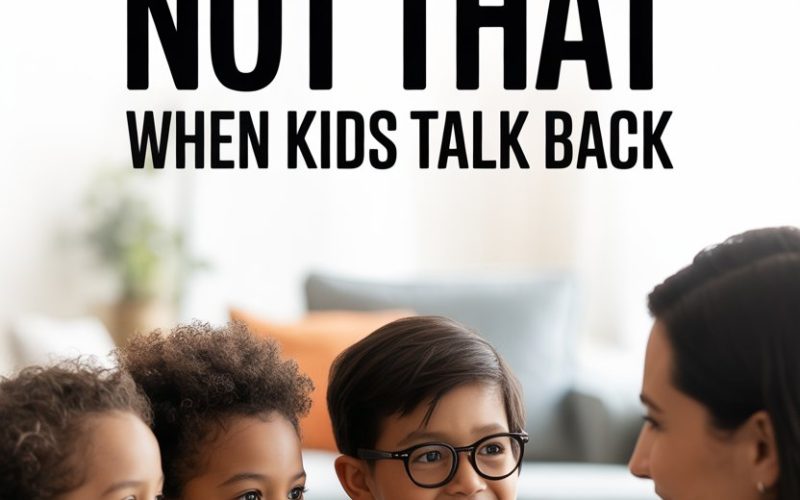Ever felt like you accidentally adopted a tiny lawyer who specializes in cross-examination? Welcome to the era of backtalk—a rite of passage for kids, and a test of patience for parents everywhere.
You’re not alone if you’ve ever stood in the kitchen, bowl of cereal in hand, stunned into silence by a pint-sized expert in loopholes and logic.
While it might feel personal (“How dare you, after all those yogurts I peeled for you!”), backtalk is almost always a sign of growing independence… and maybe a slight overdose of Peppa Pig.
Ready to reroute this daily drama?
Here’s how to upgrade your responses, keep your sanity, and teach your child the art of respectful communication—without sounding like a broken record or a drill sergeant.
Why Kids Talk Back (And Why It Isn’t Always Bad)
No, your child isn’t plotting to overthrow you. Backtalk isn’t always about defiance.
For little ones, it’s often a clumsy attempt at autonomy—flexing those new verbal muscles. For tweens and teens, it’s how they test boundaries and their place in the family hierarchy.
Clinical psychologist Laura Markham, Ph.D., explains that talking back is a form of “practicing independence,” and that children (even the stubbornest) are seeking respect and connection, not just an argument.
And yes, it’s possible to address the sass while preserving their developing self-esteem.
Pick Your Battles With Precision
Every “But why?” or “That’s not fair!” doesn’t need a courtroom response. Some days, you’ll need to channel your inner Jedi and let the minor eye roll slide off you like water off a duck.
Ask yourself: Is this a safety or kindness issue, or did my kid just sigh loudly about broccoli? If it’s minor, sometimes silence is golden.
Repeatedly engaging with every complaint can actually make it a sport. Save your energy for the hills worth dying on—like bedtime, seatbelts, and actual respect.
Avoid the Power Struggle Trap
Ever noticed how, the louder you get, the more determined your child becomes? That’s the power struggle in action—everyone’s stubborn streak comes out to play, and absolutely nobody wins.
Instead of matching volume or sarcasm (tempting, I know), try lowering your voice. Bring calm, collected energy to the moment. This not only models self-control, it’s disarming.
As child psychologist Dr. Becky Kennedy says, “Your calm is contagious.” (If only it spread as fast as chickenpox.)
Try: “I can hear you’re upset, but yelling isn’t how we talk to each other.” Not: “Don’t you dare use that tone with me!”
One sets a boundary; the other throws fuel on the fire.
The Magic of “I” Statements
Blame triggers defensiveness (even in adults—just ask your partner about unwashed dishes). Shifting to “I” statements helps your child hear you without feeling attacked.
Try: “I feel frustrated when I’m interrupted.” Or: “I need you to speak more kindly if you want my help.”
These statements spotlight your feelings and needs, not your child’s character flaws. And yes, it works better than a guilt trip.
Swap Commands for Choices
Barking orders tends to invite pushback—nobody likes being micro-managed, not even a five-year-old. Offering choices gives kids some control, while still getting things done.
Instead of: “Put your shoes on now!”
Try: “Would you like to wear the red or blue shoes today?” Or, “We’re leaving in two minutes—do you want to hop or tiptoe to the car?”
This doesn’t mean letting your child run the show. It’s about letting them practice decision-making within your parameters. Win-win.
Don’t Take the Bait
Some days, backtalk feels tailor-made to wind you up. A sarcastic “Whatever” or a dramatic sigh can push all your buttons.
Resist the urge to fire back with equal intensity.
Pause, breathe, and try a neutral response: “I can see you’re upset. Let’s try again in a minute.” Or, with older kids: “That came out a bit sharp. Want to try saying what you mean, respectfully?”
If emotions are running high, a short break (for both of you) can work wonders. Just don’t storm off muttering about running away to join the circus, tempting as it is.
Model the Manners You Want to See
Children are world-class mimics. If you want more respectful language, start with yours—even when you’re running late and the school shoes have vanished (again).
Instead of: “Why do you always lose everything?”
Try: “We’re in a rush, and I need help finding your shoes, please.” When you mess up (and you will), own it. “Oops, I shouldn’t have snapped. I’m sorry. Let’s start over.”
Apologies don’t diminish your authority—they teach accountability.
Use Humor to Defuse Tension
A flash of silliness can stop backtalk in its tracks. If your child is sulking about chores, try singing your request opera-style or using a sock puppet.
Suddenly, the mood shifts, and you’re working together instead of locking horns.
Laughter lowers stress and builds connection. Just make sure the joke is at your expense, not your child’s.
Acknowledge Their Feelings, Don’t Dismiss Them
Even the most over-the-top complaints usually have a kernel of real feeling underneath. Brushing off your child’s frustration (“You’re being ridiculous!”) can intensify it.
Instead, get curious: “It sounds like you’re upset about this. Want to tell me why?” Sometimes, just feeling heard takes the wind out of their sails.
Research from the Harvard Center on the Developing Child shows that this kind of back-and-forth helps children regulate their emotions and build trust.
Teach the “Do-Over”
Every family needs a mulligan—or five. If your child’s words come out sharp, offer a “do-over.” Prompt them gently: “Want to try that again with kinder words?”
Over time, this helps them practice—and eventually master—respectful communication.
Give yourself the same grace. When the day’s been long and you’re all running on fumes, sometimes a fresh start is the best gift you can give each other.
When Backtalk Goes Beyond Normal
Most back-and-forth is normal—if exhausting. But if your child is persistently rude, aggressive, or it’s interfering with daily life, it may be time to call in some reinforcements.
A trusted teacher, family GP, or a child psychologist can help spot underlying issues and support your family.
Keep in mind, kids with ADHD, anxiety, or sensory needs sometimes struggle more with impulse control and emotional regulation. A little extra understanding (and support) goes a long way.
Small Shifts, Big Payoff
Changing how you respond to backtalk won’t fix things overnight. But small tweaks—choosing empathy, keeping your cool, offering choices—can shift the whole family dynamic.
The real secret isn’t about controlling your child’s words. It’s about teaching them (and sometimes ourselves) to handle frustration and communicate, even when tempers are frayed.
And yes, you’ll still get the occasional eye roll. That’s part of the job description.
But you might just catch them using those words—your words—on a sibling or a mate someday, and realize it’s worked after all.
Now, if only someone could teach these kids to put socks in the laundry basket…




